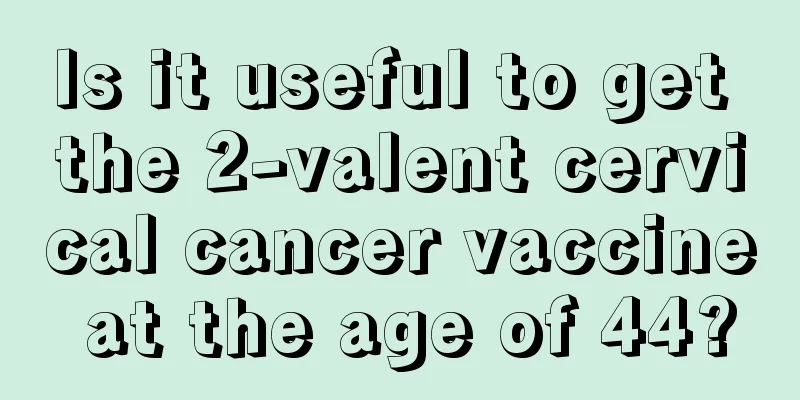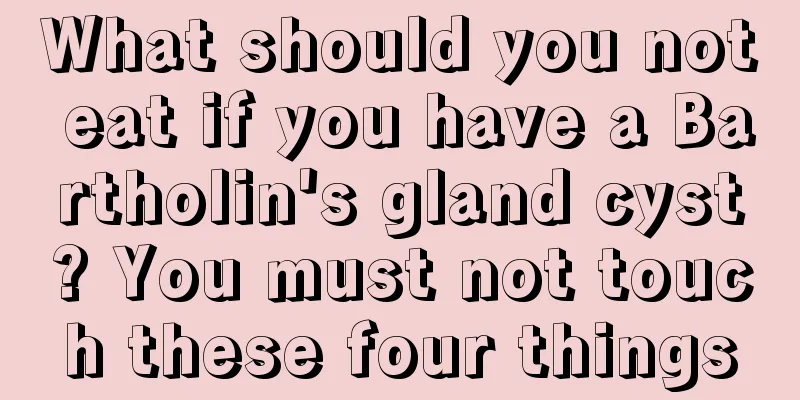Is it useful to get the 2-valent cervical cancer vaccine at the age of 44?

|
It is still useful to get the bivalent cervical cancer vaccine at the age of 44. Although the effect may not be as ideal as when vaccinated when young, it can still provide certain protection. 1. Introduction to cervical cancer vaccine Cervical cancer vaccine, medically known as HPV vaccine, is mainly used to prevent cervical cancer caused by human papillomavirus (HPV). HPV vaccines are divided into 2-valent, 4-valent and 9-valent, and the main difference lies in the type of virus they prevent. The 2-valent HPV vaccine can prevent two high-risk viruses, HPV16 and HPV18, which are the main culprits of cervical cancer. 2. Effectiveness of bivalent HPV vaccine at age 44 The 2-valent HPV vaccine is still useful at age 44. Although the vaccine is more effective when given at a younger age, it still provides some protection at age 44, especially against HPV16 and HPV18. Cervical cancer vaccination is generally not recommended for women over 45, as the vaccine's preventive effect decreases with age. 3. Vaccination process and precautions The vaccination process of the 2-valent HPV vaccine is relatively simple and is usually divided into three injections. The first shot can be injected at any time, the second shot one month after the first shot, and the third shot six months after the first shot. During this period, if you miss it for some reason, you do not need to restart the vaccination, just continue to complete the remaining injections. Menstruation does not affect the vaccination, but it is best not to get pregnant during the injection period. If you become pregnant, you need to stop the vaccination. 4. HPV infection If you have already been infected with HPV, getting the HPV vaccine will not make the virus go away. The main function of the vaccine is to prevent infection, not to treat the virus that has already been infected. However, even if you have already been infected with a certain type of HPV, getting the vaccine can still prevent infection with other types of HPV. 5. Pregnancy and vaccination There is currently no evidence that the HPV vaccine will affect fetal development, but for safety reasons, it is recommended to avoid pregnancy during the vaccination period. If you become pregnant unexpectedly during the vaccination period, it is recommended to stop the vaccination and continue the unfinished injection after delivery. 6. Personal suggestions If you are 44 years old and have not received the cervical cancer vaccine, it is recommended that you consult your doctor as soon as possible and consider receiving the 2-valent or 4-valent HPV vaccine. Although the effect may not be as ideal as when you are young, it can still provide some protection and reduce the risk of cervical cancer. Through the above points, I hope to help you better understand the effectiveness and precautions of the 2-valent cervical cancer vaccine at the age of 44. Health is the most precious wealth in life. Only by preventing and protecting yourself in time can you have a longer and happier life. |
<<: How many years does a patient with nasopharyngeal cancer generally live?
>>: There are three signs after a meal that indicate stomach cancer
Recommend
What should I do if I find out I have liver cancer? Introduction to 5 liver cancer treatment methods
Experts say that after contracting liver cancer, ...
What should I do if food is stuck in my chest and can't go in or out?
I believe that many people have encountered this ...
Can yeast and salt be put together
Yeast and salt are often used when making pasta, ...
What are the dangers of intracranial lipoma?
Intracranial lipoma is caused by abnormal embryon...
How to use liquid foundation in specific steps
Makeup has become a fashion nowadays, and every g...
What are the common symptoms of early lung cancer? A comprehensive review of early symptoms of lung cancer
Although the early symptoms of lung cancer are no...
How to check and confirm breast cancer
Like other malignant tumors, we can hardly see an...
The flesh behind the neck is very thick
Due to bad living habits, many people are too fat...
What are the preventive measures for rectal cancer
Rectal cancer is a common malignant tumor in the ...
What causes liver cancer? Check out the 4 real factors that cause liver cancer
In recent years, with the increase in the number ...
How to perform breast cancer surgery
Breast cancer surgery is performed according to n...
Yoga exercises suitable for uterine cancer
Compared with modern medical radiotherapy and che...
My fingers are numb as if I were electrocuted
Hands are the most commonly used organs of people...
Nursing diagnosis before laryngeal cancer surgery
Laryngeal cancer is a relatively serious cancer d...
Can colonoscopy detect hemorrhoids?
Eating and sleeping are normal physiological need...









